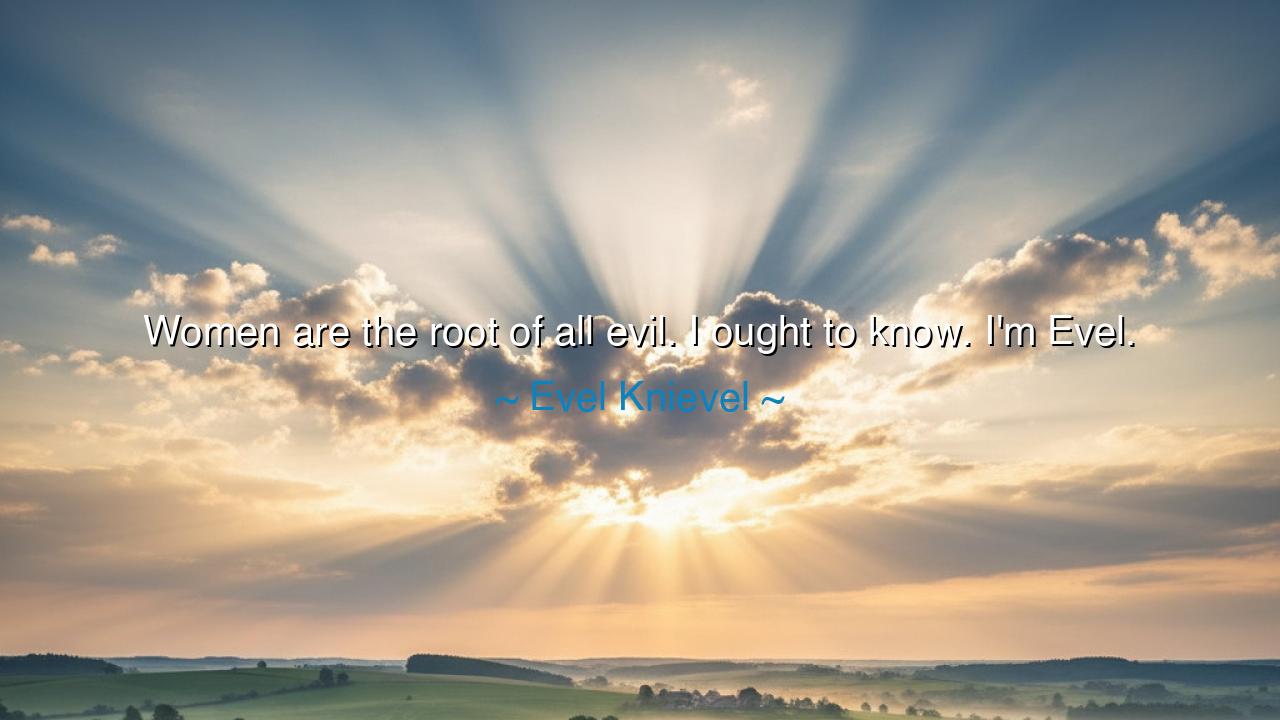
Women are the root of all evil. I ought to know. I'm Evel.






The words of Evel Knievel, “Women are the root of all evil. I ought to know. I’m Evel,” were spoken with the bravado of a man who made his life into theater. His jest twists the ancient proverb that money is the root of all evil, replacing it with women, and then tying it to his own name in a wordplay both humorous and self-aware. Beneath the joke lies the acknowledgment of temptation, desire, and the troubles that often accompany passion, while the pun reminds us that he himself lived as a man entangled with both danger and excess.
In the ancient spirit, this echoes the tales of heroes undone not by swords, but by the charms of love. From Samson and Delilah to Paris and Helen of Troy, history and myth are filled with men who fell not on the battlefield, but in the chambers of desire. Evel’s jest plays upon this eternal theme, that women, in their beauty and mystery, have the power to unmake even the strongest of men. Yet by linking it to himself, he admits that the fault lies not in them alone, but in his own reckless choices—he is “Evel,” both in name and in nature.
History bears witness in the life of Henry VIII of England, who bent a kingdom to his passions. His entanglements with women led to marriages, divorces, and executions, reshaping the very church of England. His choices revealed both the allure and the danger of letting desire govern rule. Like Knievel’s playful words, Henry’s life showed how entangled power and love can plunge men into ruin and reshape history itself.
Yet Evel’s remark, though draped in humor, also holds a mirror to humanity’s tendency to blame others for its failings. To call women the root of evil is to echo Adam’s cry in Eden, blaming Eve for the fall. But in truth, temptation cannot exist without the heart’s willingness. By adding “I ought to know,” Knievel subtly admits his complicity. His life of thrill-seeking and excess was not forced upon him, but chosen, embraced as part of his wild spirit.
So let this wisdom endure: jest often carries truth, and the laughter of the bold hides lessons for the humble. Women may be blamed for many of man’s downfalls, but in truth, it is man’s own heart that leaps into danger, just as Evel leapt across canyons. His words remind us that every soul must own its choices, for the root of evil is not only outside, but within. And even in folly, there is the chance to turn confession into wisdom for those who come after.






KLNguyen Khanh Linh
Even though Evel Knievel’s comment about women might be meant as a joke, it’s important to reflect on why these types of statements are still socially accepted. What kind of message does it send about women’s roles in society, and why do people often find such humor funny? How can we better educate ourselves to recognize when humor crosses the line from playful to harmful?
MKThach Minh Khang
Evel Knievel’s statement seems to play into the trope that women are to blame for all the chaos or misfortune in a man's life, but how much of this is cultural baggage? How does such rhetoric affect the way we think about gender and responsibility? Is it ever okay to make such sweeping generalizations, even if they are meant to be humorous? What impact does this kind of language have on societal norms?
TNNguyen Trong Nam
This quote from Evel Knievel is hard to take lightly. Is this a reflection of his personal views, or just a poor attempt at humor? Regardless, blaming women for evil seems like an oversimplification of complex human actions. How can we engage with such statements in a way that promotes equality and respect for all genders? Do we dismiss these as ‘just jokes’ or address the underlying stereotypes they reinforce?
TTrang
While Evel Knievel’s quote might be meant as a joke, it reflects a deeper issue in how women have historically been portrayed as the source of problems or temptation. Is it possible for this type of humor to be harmless, or does it reveal subtle misogyny in how we view gender relations? Should we laugh along with such statements, or should they be called out for the negative implications they carry?
KBKfjb Be
Evel Knievel’s quote seems to be a mix of humor and a self-deprecating joke, but it raises serious concerns about perpetuating harmful stereotypes. Saying that ‘women are the root of all evil’ is a problematic generalization that could be seen as offensive. Why should women be blamed for evil or misfortune? Doesn’t this reinforce outdated and damaging views about women? How do we challenge such ideas in popular culture?